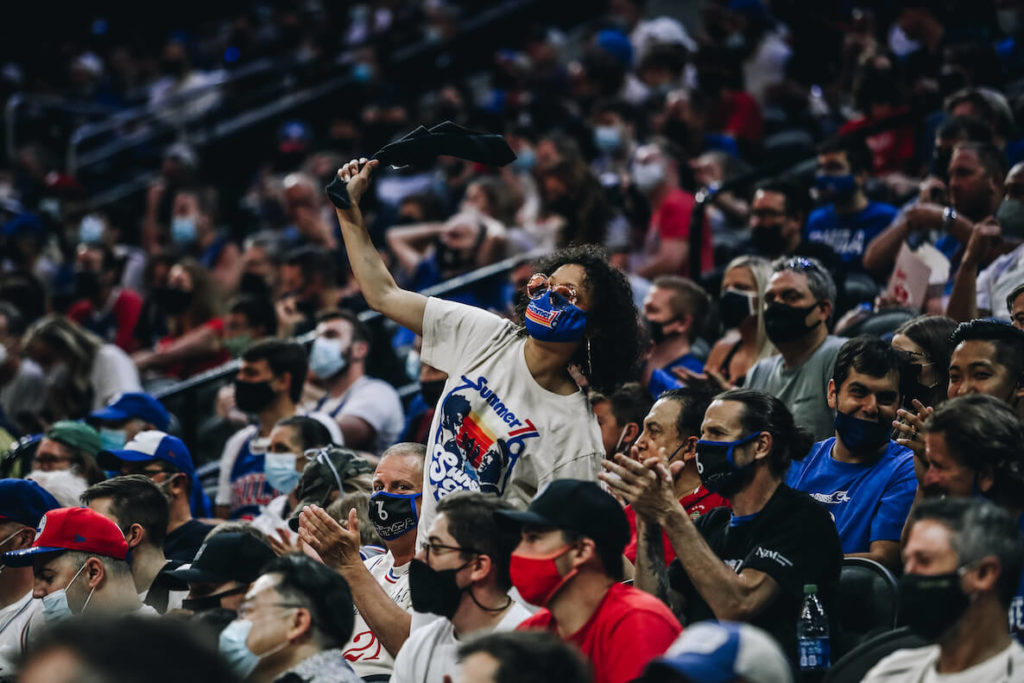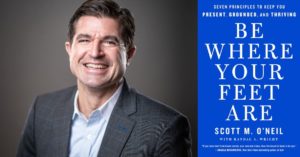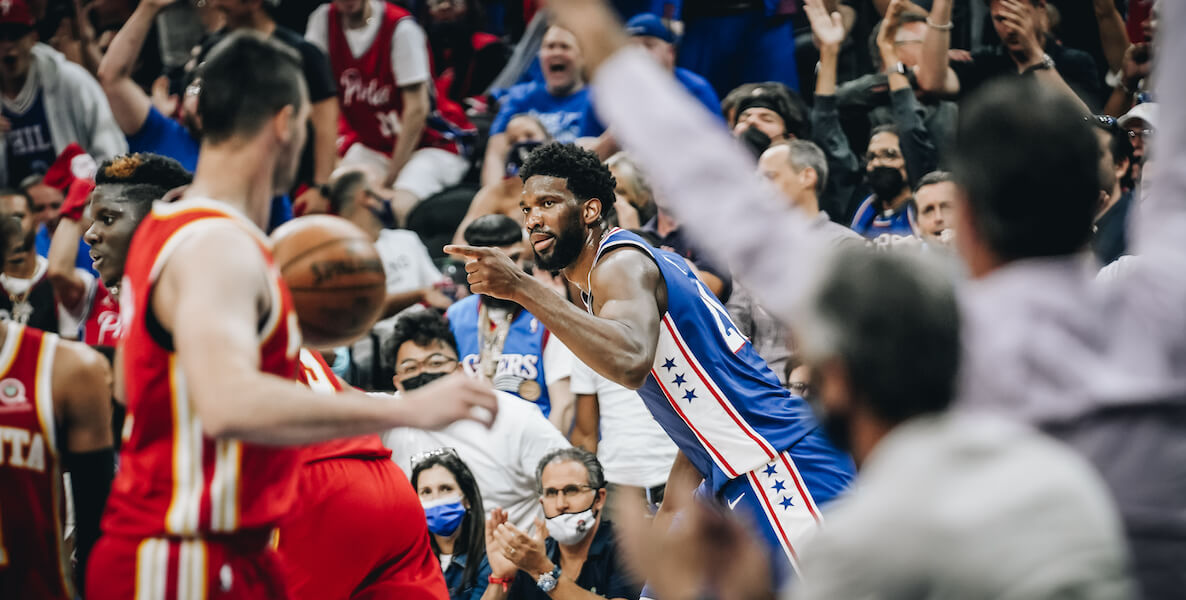Cities are living, breathing organisms, with a type of collective soul. They often take on the personality traits of their elected leader—we have one right now who is famously gloomy and grumpy—and their sports teams punch above their weight in terms of influencing a region’s psyche.
Remember the Eagles improbable Super Bowl run in 2017? Remember the camaraderie on the streets? The smiles and greetings between neighbors? The sense of shared purpose? Remember the conversations with strangers about last night’s play or that coach’s decision?
These are a city’s connective tissues. And when the opposite happens—when the sports teams fail or, worse, “choke”—a city can enter into a collective funk from which it’s hard to emerge. That is the danger zone in which we find ourselves today.
“It was 1964 all over again”
The Sixers, the Eastern Conference’s top playoff seed, have stunningly lost two games in a row to the less-talented Atlanta Hawks after holding leads of 18 and 26 points, respectively, and they face elimination Friday night. In franchise history, the team had been 165-0 in games in which they held a lead of 25 points or more—until Wednesday night. It was an epic fourth quarter collapse; watching it felt like a slow motion death march, the ending of which had been pre-ordained.
The day after, you heard the anger and panic. On sports talker WFAN, Mike Missanelli bellowed about the “disgrace” of a performance. I heard from friends who were lambasting supremely talented point guard Ben Simmons, who could only convert four of 14 foul shots, and who has only taken one—one!—shot in the last four fourth quarters. Some were pointing the finger of blame at Tobias Harris, a great player who inexplicably went MIA, and at coach Doc Rivers.
MORE ON PHILLY SPORTS AND THE CITY PSYCHE
One friend texted that “it was 1964 all over again,” a reference to what is still the worst collapse in pro sports history, when our Phils were comfortably ahead in the standings by 6 1/2 games with 12 to go, only to promptly embark upon a grinding 10-game losing streak to blow the pennant. World Series tickets had already been printed, never to be put to use. David Halberstam’s 1994 book, October 1964, lays out all the panic and succumbing to pressure that characterized the long, torturous swoon.
It was a collapse that left an indelible imprint on the city’s psyche. “While it was going on, you’d walk around the city, and it just felt like you were at a funeral,” my late father once told me. “The whole city was in a fog.”
When your city owns such ignominy, the aftereffects are long-lasting. You start practicing self-protection, like the suitor, prone to heartbreak, who breaks up with the girl in order to beat her to the gut punch. You boo athletes like Mike Schmidt (only the greatest third baseman to ever live) because you’re steeling yourself for the inevitable disappointment to come. Some years ago, I attended the funeral of the great civic leader and attorney Joe Smukler. “When the Eagles would get the ball inside the opponents’ 20-yard line,” one of his eulogizers reminisced, “he’d shout, ‘Kick a field goal now, before something terrible happens!’”
Here’s to the Sixers showing up, embracing the moment with a smile, playing a game they love like kids again, and reminding a whole city what’s possible when we reject fear and say to the scary moment, like true warriors, “you can’t touch me.”
Ah, yes, I remember thinking, the scars of ’64. My dad exhibited the same symptoms. In addition to being damn sure that, every week, the game’s announcers were dead set biased against his Eagles, he’d actually start to root against his team when it faltered. “Serves ‘em right,” he’d mutter.
There have been other Philly epic sports collapses since ’64—sadly, too many to recount here—but this Sixers’ swoon does feel like ’64 most of all. My dad said the players in ’64 were like zombies, as if they knew they were in free-fall and yet were powerless to resist the descent.
Well, watch the blank-faced expressions on Simmons, Harris and superstar center Joel Embiid. It was painful to watch Simmons’ unblinking, shellshocked postgame interview performance Wednesday night, the monotone and cliches masking so much swirling anxiety and doubt. He’s all of 24 years old, and failing on the most public of stages after being raised as a champion his whole life. It’s easy to forget that Simmons and most of his teammates are, comparatively, still kids themselves…and they’re terrified. All our shouting and blame-placing won’t help them. They’re frozen in fear.
What might help them? Look to Barkley and Lao Tzu.

Doc Rivers—a great coach, but apparently no stranger to manning the helm of teams in post-season collapse—would be well-served to not even talk to his team about basketball. The tennis great Boris Becker once astutely observed that, in the deciding fifth set of a match, the game is no longer about tennis. It’s about pressure and character and mindset. In times of panic and crisis, the freer spirit reigns supreme.
If the Sixers want to win, and in so doing elevate the psyche of our town, Rivers would be well served to eschew today’s mid-day “shoot-around” at the arena, and instead instruct the team’s bus driver to take his team to an Atlanta playground. There, these behemoths should all file out and watch a group of 10-year-olds hoop it up. They would be taking a page from another Sixers superstar, 32 years ago.
Charles Barkley was 27 in 1989 and on his way with his lawyer to an Atlantic City courtroom after he’d been arrested on a gun possession charge. (He had a license for the gun in Pennsylvania, but not in New Jersey.) Passing by an elementary school at recess time, he implored his lawyer to pull over. Let the brilliant Philly-native writer Bruce Buschel tell it from here, in the pages of the long-defunct PhillySport magazine (RIP):
The client climbs out of his car, removes his suit jacket, and walks into the schoolyard as Gulliver traveled about Lilliput. He is instantly surrounded by seven- and eight-year-olds. They throw him the basketball, and he starts shooting. His tie gets in the way. The kids are giddy with excitement. They swarm about him now, touching his suit pants and his expensive shirt. He looks down at them and smiles. He knows this place. It is safe. These small people harbor no grudges, demand no promises be kept. They will not judge him harshly if he acts childishly. They want only to be like him. If they only knew how much he wants to be like them.
As he was about to face some pretty severe grown-up judgment, Barkley sought out losing himself in the relief of childlike wonder. Somehow, Rivers needs to likewise conjure in his charges the joy that characterized their relationship to basketball before all the pressure and judgment and high-stakes business concerns. He should divorce them from their own debilitating obsession over outcome.
And that goes for all of us who find ourselves on edge about the future, be it the future of a playoff series or the future of a troubled city in post-pandemic America. We’d be well-served to take the advice from that legendary hoops coach, Taoist Lao Tzu, who was diagramming plays for the human spirit back in the 6th century B.C.: “If you are depressed you are living in the past,” he held. “If you are anxious you are living in the future. If you are at peace you are living in the present.”
After the debacle Wednesday night, one friend received a text, reading championship teams don’t lose games like that. I’d formulate it another way: Championship teams win after losing games like that.
Pulling that off, though, requires a revolution in mindset. So here’s to the Lao Tzu Sixers showing up, embracing the moment with a smile, playing a game they love like kids again, and reminding a whole city what’s possible when we reject fear and say to the scary moment, like true warriors, “you can’t touch me.”
Header image courtesy Philadelphia 76ers





